| Iowa Ag Summit ...Next > |
| March 7, 2015--Gov. Jeb Bush. (+) |
 |
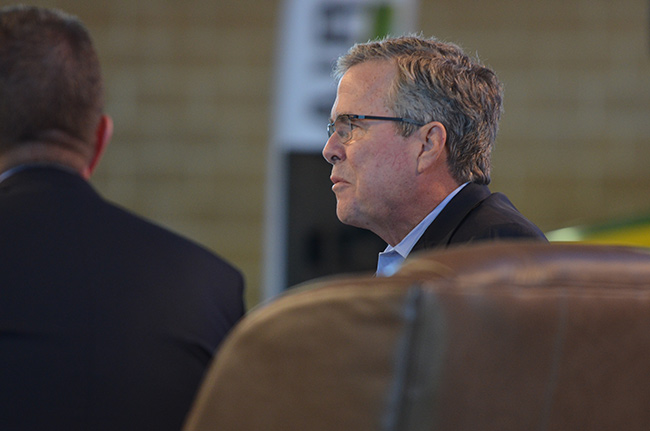 |
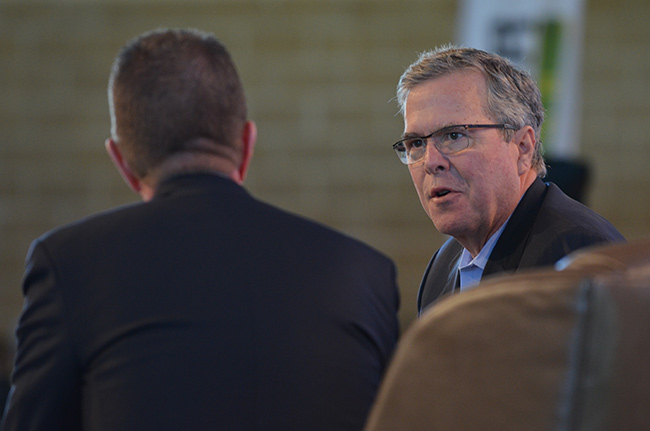 |
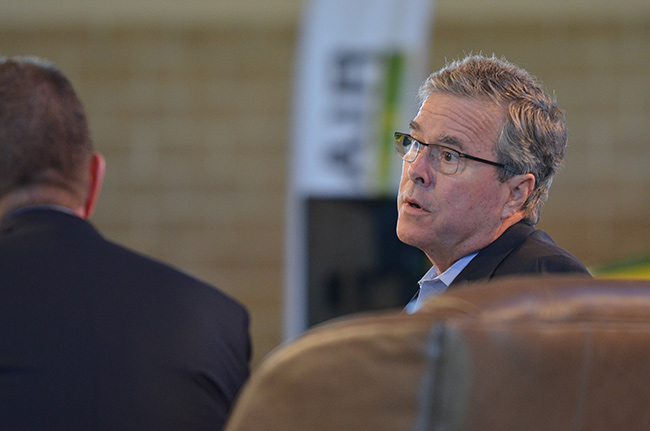 |
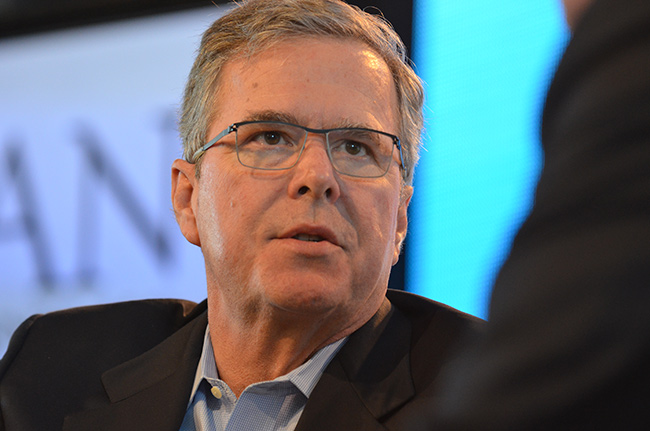 |
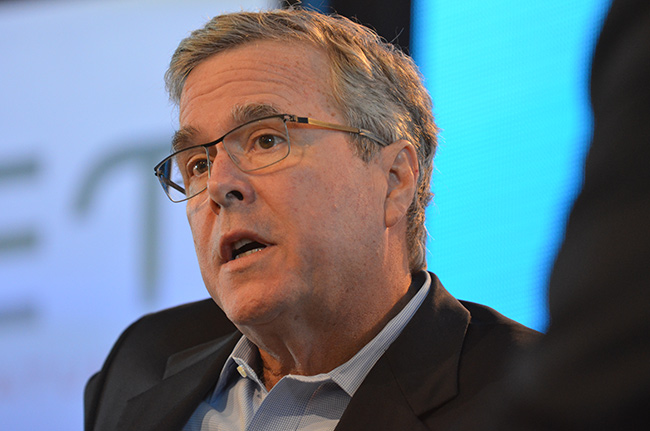 |
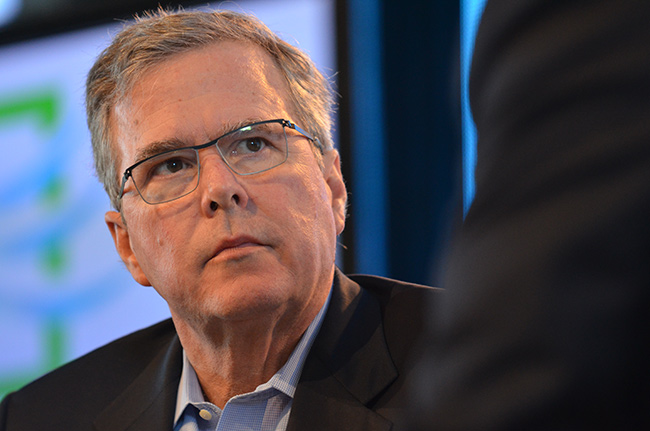 |
| Responses
on
RFS
and
wind: Rastetter: Next subject, the RFS and ethanol production and in particular the Renewable Fuel Standard--where do you come out on that? Bush: I come out on in first of all where the EPA should create a much more certain playing field to start with. This is just another example--each week I learn another example of, not just EPA but across the alphabet soup of government where the uncertainty makes it harder for people to make investment decisions, and in this case creating a certain playing field has to be part of the answer. I would suggest to you that ultimately whether it's ethanol or any other alternative fuel, renewable or otherwise, the market's ultimately going to have to decide this. The law that was passed in 2007 has worked for sure, look at the increase in production. It has been a benefit to us as we've reduced our dependency on foreing sources of oil. But as we move forward over the long haul there should be certainty for people to invest, and we ought to continue to innovate to create the lowest cost energy sources in the world so that we can grow economically. And so at some point we'll see a reduction of the RFS need because ethanol will be such a valuable part of the energy feedstock for our country. Whether that's 2022 or sometime in the future, I don't know. Rastetter: So one of the challenges for the industry is that uncertainty and efforts in Congress to repeal it and I think those, a number of people in the audience would agree with your statement on market access and consumers' choice, but what about between now and then on stability if, on the RFS that exists today? Bush: Well that's what I'm saying. The EPA needs to create guidelines. This idea that you're now, what, a year and a half, almost two years behind makes it impossible to make long-range investment decisions. So create clarity going forward of a baseline amount of ethanol. My guess is, given how successful there has been a reduction in price of cost, that ethanol will be able to compete beyond that baseline mandated amount, that their volumes will be able to grow, but it's really hard to make an investment decision that may take two or three years when you're already two or three years behind of what the baseline amount is. Rastetter: So what do you think about wind? Bush: Wind. Well I love it for Iowa; it's not so good for Florida. [laughter] Wind is-- we have sun, so you know our alternative energy sources in our state might be different than Iowa, but one of the companies that's the largest producer--it is the largest producer of wind in the United States--is a Florida-based company called NextEra, and they believe that given, again American innovation, American technology, the price of the cost of production of wind is now on its way very close to being competitive with any other feedstock and so my guess is-- Job well done. This is how America works. We create an incentive, in this case it's thee production tax credit. It's created an industry that has allowed to, that has created innovation and creativity, the American ingenuity at work; it's now competitive and I think it ought to be phased out over a period of time. Rastetter: So how would you do that with the expiration of the Wind Tax Credit that no longer is there on future wind being able to be built and where does that fit in to...? Bush: Do it over a three- to five-year period. Be certain about it. Just say here this is as long as we need to be able to be competitive to create a diverse feedstock for power generation. And this is a place where the industry wants that. They're not opposed to that at all. And that's, look, at some point these incentives, if you believe in markets working , and I do--put me in on that side of the camp; I believe in entrepreneurial capitalism and markets and prevailing. Look at the fracking revolution that happened. No one thought natural gas price would be as low as they are. It happened not because it was a government-driven deal; it was because of American innovation creating that opportunity. We ultimately need to get to that point for all of our energy sources because it will be the lowest cost energy for the greatest number of people. In this case there was a good incentive, it was put in place for you know 15-20 years. It worked. And now we're at a point where in there's a prevalence of wind it can be an important part of the energy needs of the Midwest, Texas and California. I wish it was in Florida but it isn't. |
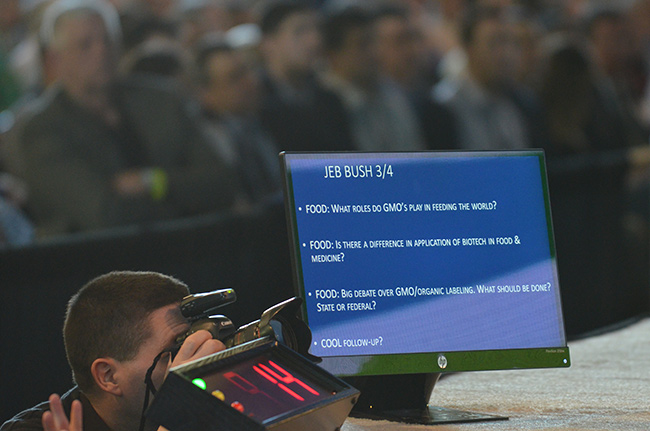 |
| This was Jeb Bush's first trip
of the 2016 cycle; he made a two-day visit of it doing a number of
events; the only other public event was a meet and greet at the Pizza
Ranch in Cedar Rapids the day before. Bush visited Iowa for his
brother's campaign in 1999-2000
and spent a lot of time in the state in 1979 on his father's campaign. |
| <
Previous | Next > |
 |
| In a curiously ironic attempt to draw attention to Jeb Bush's position on climate change, NextGen Climate flew a plane over the Summit trailing a banner "Jeb Bush: I'm Not a Scientist." |

